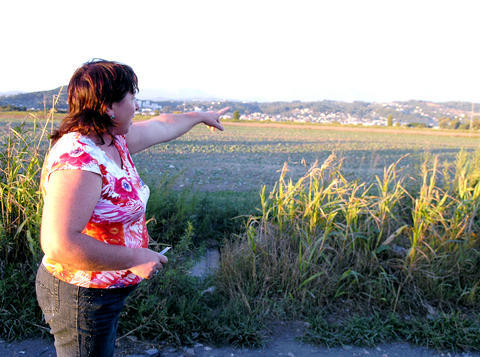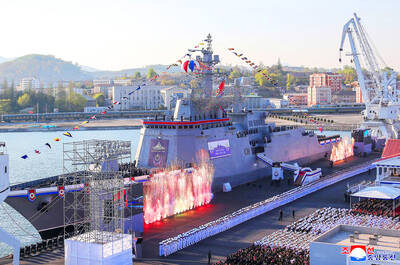For the residents of Golubaya Street, set on a wild shore of the Black Sea coastline, Russia's victorious bid to host the 2014 Winter Olympics has brought little cheer.
"They told me my house didn't fit in with their plans," said Nina Ryndina, 63, a former kindergarten teacher at a local state farm who has lived in this sunny corner of Russia for 30 years.
Ryndina is one of thousands of residents in an area known as the Imeretinsky Lowlands on the outskirts of Sochi who face imminent removal to make way for construction of the Olympic Village and ice-skating rinks.

PHOTO: AFP
Along with 29 other residents in the bungalows of leafy Golubaya Street, Ryndina has written a plea to local authorities, police, prosecutors and Russian President Vladimir Putin.
"If the state can't defend our rights, then we'll even go to the European Court of Human Rights," said Ryndina, a diminutive woman in a flower-print top sitting at a plastic table by her wooden home.
The trouble for many of the residents here is that their homes are not officially registered and they fear there will be little or no compensation for any expropriation.
Officials have sought to play down concerns ahead of construction in the Imeretinsky Lowlands, which is planned to start in April of next year, but say forced expropriation could happen.
"Expropriation should be avoided but we do not exclude it. We know this is a painful subject," Deputy Economic Development and Trade Minister Stanislav Kuznetsov said at a recent economic forum in Sochi.
Fears have been raised further among residents after a law was put forward in the Russian parliament earlier this month that would make it easier and faster for the state to seize property.
"Basically everyone knows that their houses are going to be knocked down. It's just a question of time," said Dmitry Kaptsov, 20, a local environmental and social campaigner from the North Caucasus Ecological Watch.
Kaptsov estimated the population of the lowlands at around 5,000 people.
Environmentalists warn that construction may seriously harm to a fertile area that contains rare plants and is a key stopping-off point for migratory birds.
Lyudmila Shaverneva, 38, lives with her husband and two children in a house measuring 96m2 built on a plot of land around a shack that she inherited from her father in 1993.
"It doesn't help that we've lived here all these years. Our house is considered illegal," said Shaverneva, who has been told by local officials that she will have to move into the shack, which measures 9m2.
"No one has any right to anything. We don't have any laws to protect us," said Shaverneva, who has filed an appeal in the local courts to keep the house but said she had little hope of succeeding.
Earlier this month, local television stations showed excavators tearing down one of the houses in the Imeretinsky Lowlands considered illegal. Residents understood this as a warning message.
With or without the right documents, however, some of the residents are vowing to resist any expropriation. Among them are dozens of Old Believers, a tenacious Orthodox religious sect dating back to the 17th century.
Lyuba Fursova, 45, is a member of an OldV Believer family that has farmed former swamps in the Imeretinsky Lowlands for three generations. They have a cemetery here, an Old Believer priest comes to visit on feast days.
Sitting in the shade of a vine in the courtyard of her home as her husband smoked nervously nearby, Fursova said: "Why should I leave? I've lived here all my life. I don't want to leave."

Archeologists in Peru on Thursday said they found the 5,000-year-old remains of a noblewoman at the sacred city of Caral, revealing the important role played by women in the oldest center of civilization in the Americas. “What has been discovered corresponds to a woman who apparently had elevated status, an elite woman,” archeologist David Palomino said. The mummy was found in Aspero, a sacred site within the city of Caral that was a garbage dump for more than 30 years until becoming an archeological site in the 1990s. Palomino said the carefully preserved remains, dating to 3,000BC, contained skin, part of the

TRUMP EFFECT: The win capped one of the most dramatic turnarounds in Canadian political history after the Conservatives had led the Liberals by more than 20 points Canadian Prime Minister Mark Carney yesterday pledged to win US President Donald Trump’s trade war after winning Canada’s election and leading his Liberal Party to another term in power. Following a campaign dominated by Trump’s tariffs and annexation threats, Carney promised to chart “a new path forward” in a world “fundamentally changed” by a US that is newly hostile to free trade. “We are over the shock of the American betrayal, but we should never forget the lessons,” said Carney, who led the central banks of Canada and the UK before entering politics earlier this year. “We will win this trade war and

‘BODIES EVERYWHERE’: The incident occurred at a Filipino festival celebrating an anti-colonial leader, with the driver described as a ‘lone suspect’ known to police Canadian police arrested a man on Saturday after a car plowed into a street party in the western Canadian city of Vancouver, killing a number of people. Authorities said the incident happened shortly after 8pm in Vancouver’s Sunset on Fraser neighborhood as members of the Filipino community gathered to celebrate Lapu Lapu Day. The festival, which commemorates a Filipino anti-colonial leader from the 16th century, falls this year on the weekend before Canada’s election. A 30-year-old local man was arrested at the scene, Vancouver police wrote on X. The driver was a “lone suspect” known to police, a police spokesperson told journalists at the

North Korean leader Kim Jong-un has unveiled a new naval destroyer, claiming it as a significant advancement toward his goal of expanding the operational range and preemptive strike capabilities of his nuclear-armed military, state media said yesterday. North Korea’s state-run Korean Central News Agency (KCNA) said Kim attended the launching ceremony for the 5,000-tonne warship on Friday at the western port of Nampo. Kim framed the arms buildup as a response to perceived threats from the US and its allies in Asia, who have been expanding joint military exercises amid rising tensions over the North’s nuclear program. He added that the acquisition